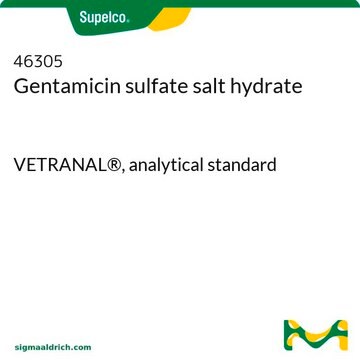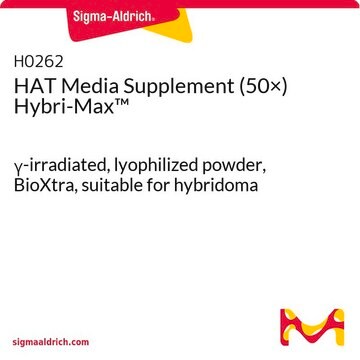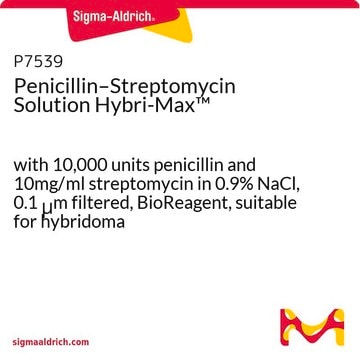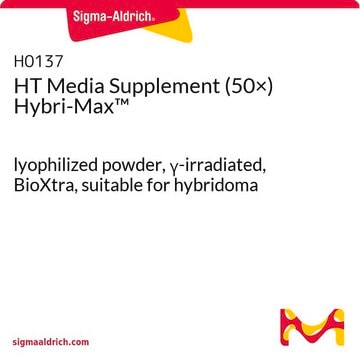G1522
Gentamicin
solution, suitable for hybridoma, BioReagent
Sinónimos:
Garamycin, Gentiomycin C
About This Item
Productos recomendados
product name
Gentamicina solution, Hybri-Max™, 0.1 μm filtered, 50 mg/mL gentamicin, BioReagent, suitable for hybridoma
grade
Hybri-Max™
Quality Level
sterility
0.1 μm filtered
product line
BioReagent
form
liquid
quality
Prepared in tissue culture grade water.
concentration
50 mg/mL gentamicin
technique(s)
cell culture | hybridoma: suitable
impurities
endotoxin, tested
color
colorless to light yellow
density
1.000 g/cm3
antibiotic activity spectrum
Gram-negative bacteria
Gram-positive bacteria
mycoplasma
mode of action
protein synthesis | interferes
storage temp.
2-8°C
SMILES string
OS(O)(=O)=O.CN[C@@H]1[C@@H](O)[C@H](OC[C@]1(C)O)O[C@H]2[C@H](N)C[C@H](N)[C@@H](O[C@H]3O[C@H](CN)CC[C@H]3N)[C@@H]2O.CN[C@@H]4[C@@H](O)[C@H](OC[C@]4(C)O)O[C@H]5[C@H](N)C[C@H](N)[C@@H](O[C@H]6O[C@@H](CC[C@H]6N)[C@@H](C)N)[C@@H]5O.CN[C@H](C)[C@@H]7CC[C@@H](N)[C@H](O7)O[C@@H]8[C@@H](N)C[C@@H](N)[C@H](O[C@H]9OC[C@](C)(O)[C@H](NC)[C@H]9O)[C@H]8O
InChI
1S/C21H43N5O7.C20H41N5O7.C19H39N5O7.H2O4S/c1-9(25-3)13-6-5-10(22)19(31-13)32-16-11(23)7-12(24)17(14(16)27)33-20-15(28)18(26-4)21(2,29)8-30-20;1-8(21)12-5-4-9(22)18(30-12)31-15-10(23)6-11(24)16(13(15)26)32-19-14(27)17(25-3)20(2,28)7-29-19;1-19(27)7-28-18(13(26)16(19)24-2)31-15-11(23)5-10(22)14(12(15)25)30-17-9(21)4-3-8(6-20)29-17;1-5(2,3)4/h9-20,25-29H,5-8,22-24H2,1-4H3;8-19,25-28H,4-7,21-24H2,1-3H3;8-18,24-27H,3-7,20-23H2,1-2H3;(H2,1,2,3,4)/t9-,10-,11+,12-,13+,14+,15-,16-,17+,18-,19-,20-,21+;8-,9-,10+,11-,12+,13+,14-,15-,16+,17-,18-,19-,20+;8-,9+,10-,11+,12-,13+,14+,15-,16+,17+,18+,19-;/m110./s1
InChI key
RDEIXVOBVLKYNT-HDZPSJEVSA-N
¿Está buscando productos similares? Visita Guía de comparación de productos
Categorías relacionadas
General description
Application
Biochem/physiol Actions
Espectro antimicrobiano: Incluye bacterias gramnegativas y grampositivas, entre ellas cepas resistentes a la tetraciclina, el cloranfenicol, la canamicina y la colistina, en particular cepas de pseudomonas, Proteus, Staphylococcus y Streptococcus.
Components
Caution
Legal Information
¿No encuentra el producto adecuado?
Pruebe nuestro Herramienta de selección de productos.
replaced by
signalword
Danger
hcodes
Hazard Classifications
Resp. Sens. 1 - Skin Sens. 1
Storage Class
12 - Non Combustible Liquids
wgk_germany
WGK 2
flash_point_f
Not applicable
flash_point_c
Not applicable
Elija entre una de las versiones más recientes:
Certificados de análisis (COA)
¿No ve la versión correcta?
Si necesita una versión concreta, puede buscar un certificado específico por el número de lote.
¿Ya tiene este producto?
Encuentre la documentación para los productos que ha comprado recientemente en la Biblioteca de documentos.
Los clientes también vieron
Artículos
Antibiotic kill curve is a dose response experiment in which mammalian cells are subjected to increasing amounts of selection antibiotic
Antibiotic kill curve is a dose response experiment in which mammalian cells are subjected to increasing amounts of selection antibiotic
Antibiotic kill curve is a dose response experiment in which mammalian cells are subjected to increasing amounts of selection antibiotic
Antibiotic kill curve is a dose response experiment in which mammalian cells are subjected to increasing amounts of selection antibiotic
Nuestro equipo de científicos tiene experiencia en todas las áreas de investigación: Ciencias de la vida, Ciencia de los materiales, Síntesis química, Cromatografía, Analítica y muchas otras.
Póngase en contacto con el Servicio técnico








